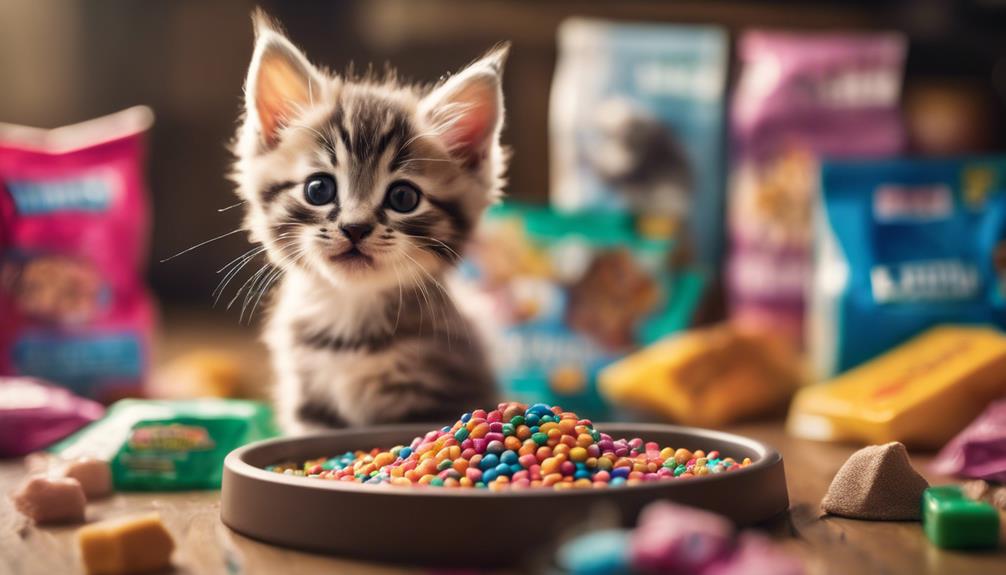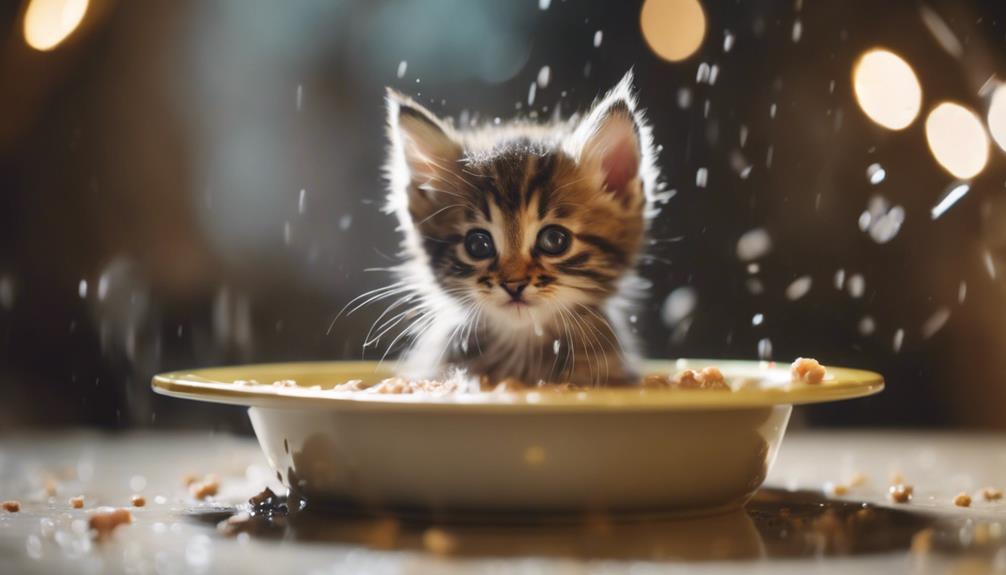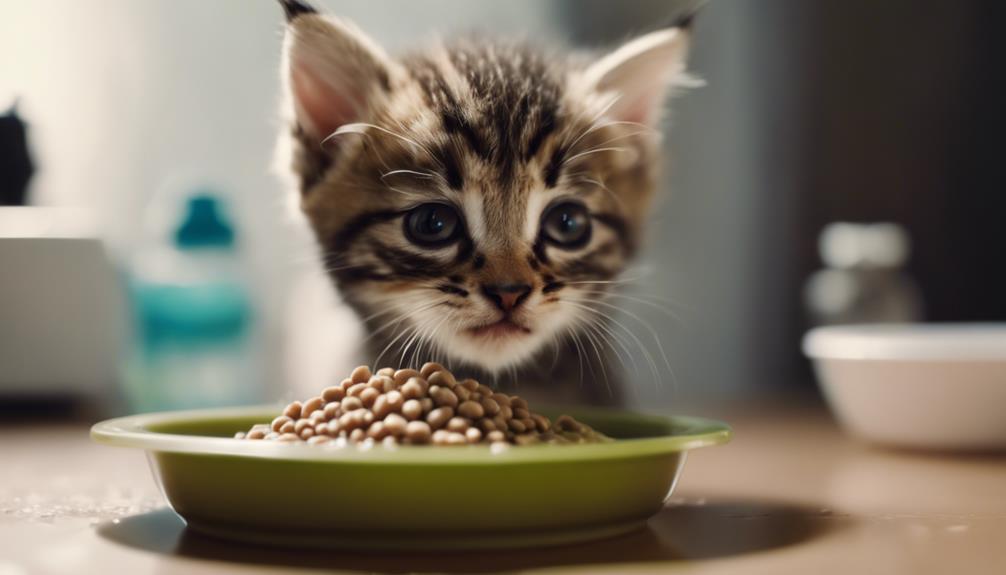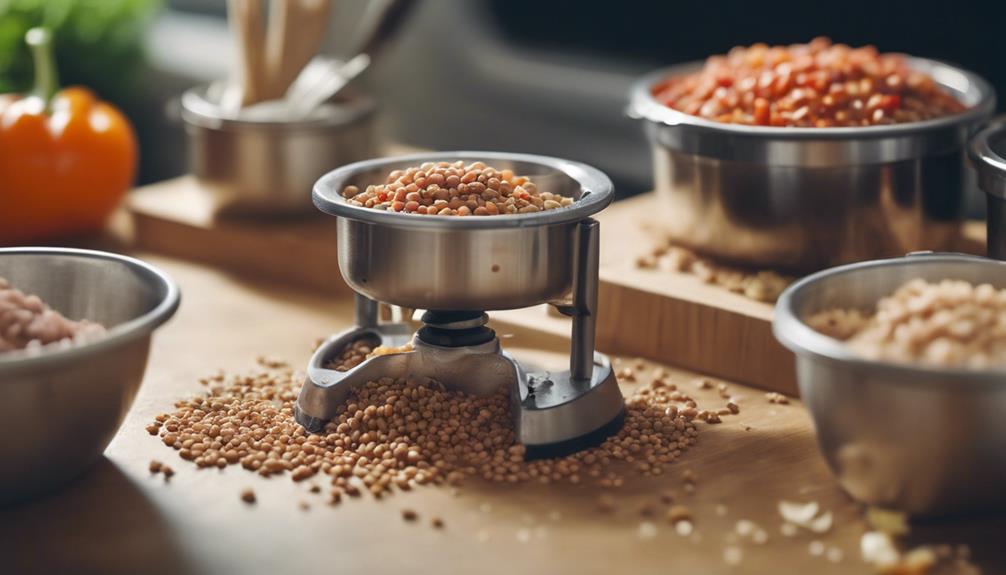As kittens embark on their journey towards independence, the timing of introducing solid foods is a critical aspect of their development.
A veterinarian's perspective sheds light on the nuances of this process, hinting at insights that challenge conventional expectations.
Understanding the intricacies of kitten nutrition and the pivotal role it plays in their well-being is essential for every pet owner.
Stay tuned to unravel the mysteries surrounding the early stages of feline feeding habits and discover why the transition to solid foods may happen sooner than anticipated.
Key Takeaways
- Kittens start weaning at around 3 weeks old due to their inability to go to the bathroom independently.
- Introduce specially formulated kitten food like Royal Canin Mother and Babycat for neonatal kittens.
- Gradually transition kittens to wet food between four to six weeks, followed by moistened kibble.
- Consult a veterinary nutritionist for guidance on transitioning to adult maintenance food after 1 year.
Kitten Growth and Development Timeline
At what rate do kittens grow and develop during their initial year of life? Kittens undergo rapid growth, particularly in the first six months. In this initial phase, their weight increases significantly, starting at around 100 grams and reaching about 6 pounds by the half-year mark. Notably, a kitten's body weight typically doubles within the first two weeks of life.
During this period, kittens rely solely on their mother's milk for nourishment until they begin the weaning process at approximately 3 weeks old. This early growth and development stage sets the foundation for their overall health and well-being as they transition from infancy to adolescence.
Weaning Process and Milestones
During the weaning process, kittens transition from solely consuming their mother's milk to starting to eat solid food. This critical phase typically begins around 3 weeks of age when kittens start to show interest in their mother's food. As they become more curious and independent, they may nibble on moistened kitten food.
Importance of Specially Formulated Food

One must appreciate the significance of incorporating specially formulated food into a kitten's diet to ensure their optimal growth and development.
Specially formulated kitten food provides essential nutrients tailored to meet the specific needs of growing kittens. These foods are designed to support healthy bone development, muscle growth, and overall well-being during this crucial stage of life.
Formulated with higher levels of protein, fats, vitamins, and minerals, they cater to the increased energy requirements of kittens for proper growth and development.
Transitioning to Solid Foods
The transition to solid foods marks a crucial milestone in a kitten's growth and development, signifying their readiness to explore a broader range of nutritional options. This transition usually begins around four weeks of age when kittens start to show interest in their mother's food.
To facilitate this process, it is recommended to introduce specially formulated kitten food that is easy for them to digest. Starting with wet food can help kittens adjust to the texture and taste, gradually transitioning to moistened kitten kibble. It is essential to monitor their progress during this phase, ensuring they are eating enough and gaining weight appropriately.
This gradual shift prepares kittens for a balanced diet and sets the foundation for their future nutritional needs.
Feeding Guidelines for Kittens

As kittens progress towards solid foods, ensuring proper feeding guidelines is essential for their nutritional development and overall well-being. Introduce specially formulated kitten food certified by AAFCO, with meat as a primary ingredient. Starting with Royal Canin Mother and Babycat for neonatal kittens is recommended.
Avoid feeding kittens adult cat food or dog food. Gradually introduce wet food between four to six weeks of age, followed by moistened kibble. Kittens should be fed special kitten food for 6-9 months due to rapid growth, transitioning to adult maintenance food around 1 year old.
Consult a veterinary nutritionist for a homemade diet transition and adjust feeding schedules or food types based on individual kitten needs. Proper nutrition is crucial for supporting the health and optimal growth of kittens.
Nutritional Needs of Growing Kittens
Commencing the transition to solid foods, growing kittens necessitate specialized nutrition to support their developmental requirements. To ensure kittens receive the essential nutrients for their growth, a balanced diet is crucial. Here is a breakdown of the nutritional needs of growing kittens:
| Nutrient | Importance |
|---|---|
| Protein | Essential for muscle and tissue growth |
| Fat | Provides energy and aids in nutrient absorption |
| Vitamins | Support various bodily functions |
| Minerals | Important for bone development |
| Water | Vital for hydration and overall health |
| Taurine | Critical for heart and eye health |
Common Feeding Mistakes to Avoid

Initiating the transition to solid foods for growing kittens requires careful attention to avoid common feeding mistakes. One common mistake is rushing the weaning process before kittens are ready, which can lead to nutritional deficiencies and digestive issues. Additionally, offering inappropriate foods like adult cat food, dog food, or items like tuna and table scraps can also be detrimental to a kitten's health.
Overfeeding or underfeeding can impact a kitten's growth and development negatively. It's crucial to follow proper feeding guidelines, such as introducing specially formulated kitten food gradually and consulting a veterinarian for dietary advice. Ensuring a balanced diet tailored to a kitten's specific needs is essential for their overall well-being and long-term health.
Consulting a Veterinary Nutritionist
When seeking tailored dietary advice and nutrition guidance for kittens, consulting a veterinary nutritionist is recommended to ensure optimal health and well-being. Veterinary nutritionists are experts in formulating diets that meet the specific nutritional needs of kittens, taking into account factors such as age, breed, health conditions, and lifestyle. Here are some reasons why consulting a veterinary nutritionist is beneficial:
- Tailored dietary recommendations based on the individual kitten's needs.
- Expertise in formulating balanced and complete diets.
- Guidance on choosing the right commercial kitten food or homemade diet.
- Assistance in addressing dietary concerns or health issues through nutrition.
- Regular follow-ups to monitor the kitten's progress and make necessary adjustments.
Homemade Diet Considerations

Considering the nutritional needs of kittens, exploring homemade diet options can be a beneficial choice for pet owners seeking to provide tailored and wholesome nutrition. When opting for a homemade diet for kittens, it is crucial to ensure that it meets all the necessary nutritional requirements to support their growth and development. Here is a comparison table to help you understand the key considerations when deciding between homemade and commercial kitten diets:
| Homemade Diet | Commercial Diet |
|---|---|
| Allows for customization of ingredients | Formulated to meet specific nutritional needs |
| Requires careful planning to ensure balanced nutrition | Convenient option with pre-measured nutrients |
| May involve more time for preparation | Easy to feed and store |
| Cost-effective but must be done correctly | Ensures consistent quality and safety standards |
Monitoring Kitten's Health and Growth
Exploring the health and growth of kittens necessitates vigilant monitoring to ensure their well-being and development align with their nutritional requirements.
- Regularly weigh kittens to track growth progress.
- Monitor litter box habits to ensure proper digestion.
- Check for signs of dehydration by gently lifting the skin on the back of the neck.
- Keep an eye on energy levels and playfulness for indications of health.
- Schedule routine veterinary visits for comprehensive health assessments.
Frequently Asked Questions
Can Kittens Eat the Same Food as Adult Cats?
Kittens should not eat the same food as adult cats due to their specific nutritional requirements for growth and development. It is essential to provide specially formulated kitten food to support their rapid growth and ensure optimal health.
Is It Safe to Give Kittens Milk as Part of Their Diet?
While kittens may seem to enjoy milk, it's not recommended as part of their diet due to potential lactose intolerance. Consult a veterinarian to ensure kittens receive proper nutrition through specially formulated kitten food to support their growth and development.
How Often Should I Feed My Kitten Throughout the Day?
When determining how often to feed a kitten throughout the day, it is recommended to provide small, frequent meals to support their growth and development. Consult with a veterinarian for personalized feeding schedules tailored to your kitten's specific needs.
Are There Any Specific Food Allergies or Intolerances That Kittens May Have?
Kittens, like humans, can develop food allergies or intolerances. Common culprits include dairy, grains, and certain proteins. It's essential to monitor your kitten's reactions to specific foods, consult with a veterinarian, and provide a balanced diet to ensure optimal health.
What Are Some Signs That My Kitten May Not Be Getting Enough Nutrients From Their Food?
Signs that a kitten may not be getting enough nutrients include poor growth, dull coat, lethargy, and digestive issues. Consult a veterinarian for a thorough evaluation and dietary recommendations tailored to your kitten's specific needs and health status.
Is Diarrhea in Kittens Related to Their Transition to Eating Food?
Yes, kitten diarrhea can occur when transitioning to solid food. It’s essential to monitor their stools and gradually introduce new food. If diarrhea persists, seeking vet consultation is crucial to ensure the kitten’s health and well-being. Early intervention can prevent complications and discomfort for the kitten.
Conclusion
In conclusion, the journey of feline development includes a crucial transition from maternal nourishment to independent feeding. Understanding the optimal timing and dietary considerations for introducing kittens to solid foods is essential for their growth and vitality.
By adhering to informed feeding practices, pet owners can play a pivotal role in fostering their kittens' nutritional well-being and longevity. Monitoring the kitten's health and growth, consulting a veterinary nutritionist, and avoiding common feeding mistakes are key steps in ensuring a healthy transition to solid foods.




